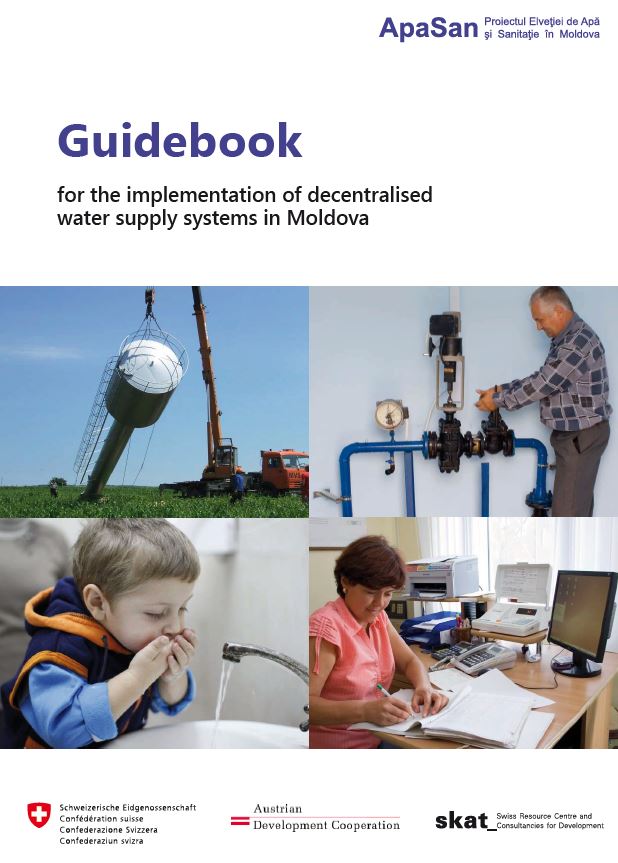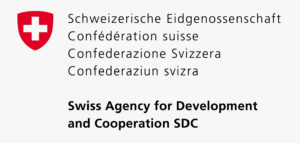Local management of water services
ApaSan has supported communities and local public authorities in all villages to establish structures for sustainable operation and management of the systems. The management model used in most villages was community based operation (Water Consumer Association, WCA). It was continuously improved throughout the project and is also suitable for small municipal or inter-municipal enterprises. Local management will be the key element for the foreseeable future for improving water services in rural areas. ApaSan also supports the Congress of Local Authorities of Moldova (CALM) to establish a service centre that provides technical assistance to small water operators (SOMAS), thus contributing to the sustainability of locally managed water services.
Water Safety Plan
The Moldovan National Program for implementation of objectives derived from the Protocol on Water and Health sets a target of having effective water safety plans (WSPs) in all agglomerations having more than 5,000 inhabitants by the year 2020. To support the effort and develop a long lasting expertise in WSPs implementation, Skat supervised WSPs in two Moldovan villages. Methodology and lessons learned from this experience are presented in the following document.
| Water Safety Planning: Key Lessons Learned from Elaborating Water Safety Plans in Two Moldovan Villages | pdf-eng |
Guidebook
The guidebook summarises ApaSan’s experience with decentralised technical solutions and community based management for rural water supply. It provides guidance for implementation, and collects all documents and tools that may be useful in implementation.
| Guidebook for the implementation of decentralised water supply systems in Moldova | pdf-eng, pdf-ro |
|---|---|
| Annexes | |
| Cartea tehnica/logbook for construction works | pdf-ro |
| Description of the WCA registration procedure | pdf-ro |
| Decision 934 on water requirements for drinking water | pdf-ro |
| Example of a concession contract between a LPA and a WCA | pdf-ro |
| Example of a contract for the construction of a water supply system | pdf-ro-eng |
| Example of a contract for the technical design of a water supply system | pdf-ro-eng |
| Example of a cooperation contract | pdf-ro-eng |
| Example of a job description of a WCA accountant | pdf-ro |
| Example of a job description of a WCA technician | pdf-ro |
| Example of a service delivery contract between WCA and water consumers | pdf-ro |
| Example of internal regulations of procedures in a WCS | pdf-ro |
| Example of a water bill | pdf-ro |
| Template for an annual WCA budget | pdf-eng |
| Example of an operation, maintenance and monitoring plan | pdf-ro |
| Example of an annual report of the audit commission | pdf-ro |
| Example of an annual report of the WCA president | pdf-ro |
| Example of cooperation offer of ApaSan for support for establishing community managed water supply systems | pdf-ro |
| Example of inventory list of WCA assets | pdf-ro |
| Example of minutes of board meeting | pdf-ro |
| Example of minutes of a general assembly meeting | pdf-ro |
| Example of minutes of the final reception | pdf-ro |
| Example of minutes of the reception of finalised works | pdf-ro |
| Example of statutes of a WCA | pdf-ro |
| Example of tender documents for the construction of a water supply system | pdf-ro |
| Example of tender documents for the design of a water supply system | pdf-ro |
| Examples of billboards at WCA offices | pdf-ro |
| Format for recording of household meter readings | pdf-ro |
| Instructions for building the chamber for a household connection | pdf-ro |
| Law Nr 837 on public associations | pdf-ro |
| List of documents that have to be present in a WCA office | pdf-ro-eng |
| Monitoring forms for recording interventions, evidence of services provided to WCA members, recording of rainfall, recording of water flows into reservoirs and networks, calculation of water balance | pdf-ro |
| Progress Checkliste about payments and construction of connection chambers | pdf-ro |
| Project Management system for quality assurance in the construction of water supply | pdf-ro-eng |
| Pumping Station Section A-A
Pumping Station Section B-B Pumping Station Ground Pumping Station Front and Side View Pumping Station Plan View Basement | pdf-eng |
| Reference plan of a reservoir-Plan View
Reservoir section A-A B-B Reservoir front view section | pdf-eng |
| Reference plans of a spring catchment | pdf-eng |
| Regulation on the organisation and operation of public water services | pdf-ro |
| Spring catchment, Series of Manual on Drinking Water Supply, Skat, 2001 | pdf-eng |
| Template for minutes of meetings of weekly construction site meetings | pdf-ro |
| Template of accounting policy | pdf-ro |
| Template of annual WCA financial report to authorities | pdf-ro |
| Template of annual WCA financial report to members | pdf-ro |
Regional management of water services (regionalisation)
Regionalisation is the expansion of services provided by urban utilities (ApaCanal) to rural areas. Regionalisation is strongly promoted by the Moldovan government and international partners as an important management model for the future, however it is still in its infancy in Moldova and very little practical experience exists. ApaSan helped creating the first cases of regionalisation of water services in Moldova by supporting some rural municipalities in delegating management of their water services to urban utilities:
- Alexandru Ioan Cuza village (Cahul rayon) delegated water supply service provision to SA ,,Apa-Canal Cahul”
- Mileşti village (Nisporeni rayon) delegated water supply service provision to SA ,,Apa-Canal Nisporeni”
- Zăluceni, Vertiujeni, Tîrgul-Vertiujeni, Băhrineşti, Japca, Cuhureştii de Sus and Cuhureştii de Jos villages (all in Floreşti rayon) delegated water supply service provision to SA ,,Servicii Comunale Floreşti” (SCF)
Technical solutions for decentralised water treatment
Local water systems based on spring water catchment provide generally good water quality and are cheap and easy to manage. However, in many locations in Moldova, spring water is not available and groundwater or surface water needs to be used, which usually needs to be treated to be safe for consumption. ApaSan has introduced technical solutions for treatment of ground water that have low operating and investment requirements and are thus well suited for small water systems with local management.
In-Situ Groundwater Treatment for Removal of Iron and Manganese: Experience in Moldova
Relatively high iron and manganese concentration levels in the groundwater are common in Moldova. Those compounds, even if not directly dangerous for health, both do pose aesthetic and technical issues. The most common treatment technique, consisting in aerating the extracted water and filter it, being thought to be too labour intensive and expensive to be sustainable in the context of rural Moldova, Skat, through the ApaSan project, proposed the less well-known but proven to be efficient in-situ technique for iron and manganese removal. The in-situ technique, consisting in reinjecting oxygen-enriched water directly into the aquifer, has been implemented in two Moldovan villages. The present paper describes the experience done in both villages and the technology’s suitability and sustainability in the context of rural Moldova.
| In-Situ Groundwater Treatment for Removal of Iron and Manganese: Experience in Moldova | pdf-eng |









